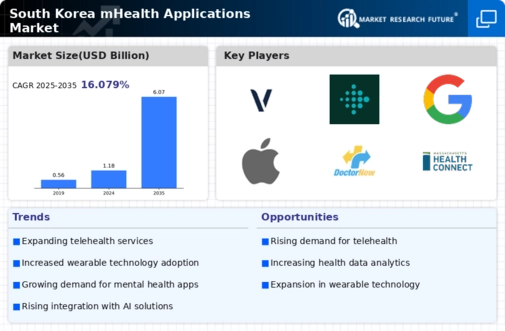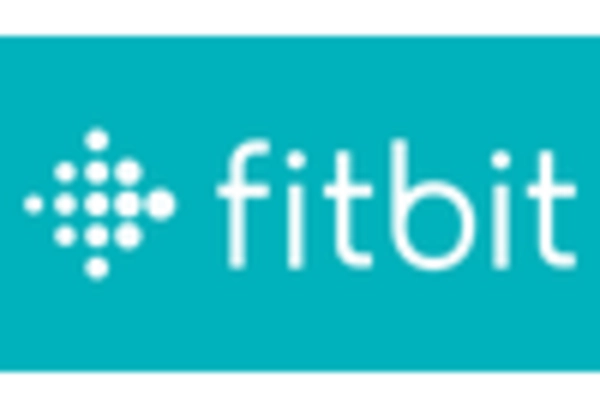Growing Health Awareness
The rising health awareness among the South Korean population is a significant driver for the mhealth applications market. With an increasing focus on personal health and wellness, individuals are more inclined to utilize mobile health applications to track their fitness, nutrition, and overall well-being. Surveys indicate that approximately 70% of South Koreans are now actively seeking ways to improve their health, which correlates with the growing adoption of mhealth solutions. This trend is further supported by the increasing prevalence of lifestyle-related diseases, prompting individuals to take charge of their health through technology. Consequently, the mhealth applications market will likely expand as more users turn to mobile platforms for health management., suggesting a potential market size increase to $1 billion by 2027.
Rising Smartphone Penetration
The increasing penetration of smartphones in South Korea is a pivotal driver for the mhealth applications market. As of 2025, smartphone ownership in the country is estimated to exceed 95%, facilitating easy access to mobile health solutions. This widespread adoption enables users to engage with various health applications, ranging from fitness tracking to chronic disease management. The convenience of mobile technology allows individuals to monitor their health metrics in real-time, thereby promoting proactive health management. Furthermore, the integration of advanced features in smartphones, such as biometric sensors, enhances the functionality of mhealth applications. This trend suggests that as smartphone usage continues to rise, the mhealth applications market will likely experience substantial growth, driven by an increasingly health-conscious population eager to leverage technology for better health outcomes.
Government Initiatives and Support
Government initiatives in South Korea play a crucial role in propelling the mhealth applications market. The South Korean government has been actively promoting digital health solutions through various policies and funding programs. For instance, the Ministry of Health and Welfare has allocated significant resources to support the development and implementation of mhealth technologies. This includes grants for startups and incentives for healthcare providers to adopt mobile health solutions. As a result, the mhealth applications market is witnessing increased innovation and a surge in new applications tailored to meet the needs of the population. The government's commitment to enhancing healthcare accessibility through technology indicates a favorable environment for mhealth applications, potentially leading to a market growth rate of over 20% annually in the coming years.
Increased Collaboration with Tech Companies
The mhealth applications market is experiencing a surge in collaboration between healthcare providers and technology companies. This trend is characterized by partnerships aimed at developing innovative mobile health solutions that enhance patient care. In South Korea, numerous tech firms are investing in healthcare technology, leading to the creation of applications that integrate artificial intelligence and data analytics. These collaborations enable the development of tailored health solutions that address specific patient needs, thereby improving health outcomes. As these partnerships continue to grow, the mhealth applications market is likely to benefit from enhanced product offerings and increased consumer trust in mobile health solutions. This collaborative approach may lead to a market expansion, with projections suggesting a potential increase in market value to $2 billion by 2028.
Technological Advancements in Health Monitoring
Technological advancements in health monitoring devices are significantly influencing the mhealth applications market. Innovations such as wearable devices, including smartwatches and fitness trackers, are becoming increasingly popular in South Korea. These devices often integrate seamlessly with mhealth applications, allowing users to monitor vital signs, physical activity, and sleep patterns. The data collected from these devices can be analyzed through mobile applications, providing users with personalized health insights. As the technology continues to evolve, the capabilities of mhealth applications are expected to expand, offering more sophisticated features such as remote patient monitoring and telehealth services. This evolution indicates a promising future for the mhealth applications market, as consumers increasingly seek comprehensive health management solutions.
















